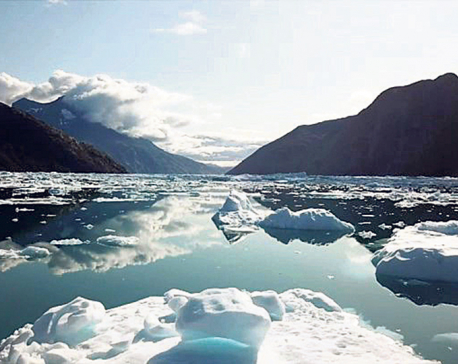
OR
Opinion
Transition to a Green Economy in Developing Countries
Published On: February 7, 2023 09:00 AM NPT By: Basu Gautam


Basu Gautam
The author is the President and Founder of Lumbini World Peace Forum, as well as an activist in 1 Million Trees Plantation Drive in Nepal.news@myrepublica.com
More from Author
- The Green Economy: A Win-Win for People and the Planet
- Greening Our Path to Peace: The Link between Environment, Peace, and CSR
- Price of Progress: The Balance between Growth and Sustainability
- Ecological Principles and the Climate Crisis in Buddhism
- Living Sustainably to Ensure a Future of Sustainability
As we all know, the earth's life is being threatened by ongoing climate change, and certain changes are occurring. Climate change is a danger to both human life and the survival of all animal species on the planet. In recent decades, the phenomenon has been observed all over the world, resulting in a rise in global temperature, and its influence is now being felt internationally. This is the most difficult reality that we must face. Destructive events have already been documented in several places, and several nations have suffered significant losses as a result of climate-related disasters. The repercussions of climate change are irreversible, according to the most recent scientific research, and we must act immediately. In addition, we must prepare the future generation to deal with this reality and take steps to limit its effects.
The Himalayan impact of climate change
As a result of climate change, rising temperatures, melting glaciers, and changes in precipitation patterns are all projected to have a significant impact on the Himalayan region including Nepal. More flooding, landslides, and glacial lake outburst floods are expected as a result of these changes, as well as less water available for drinking, agriculture, and electricity generation. Extreme weather events associated with climate change are projected to have a significant impact on biodiversity in the region, as well as the livelihoods and well-being of people who rely on the region's natural resources. It is also expected to have an impact on tourism and cultural heritage sites in the region.
Women, children, and the elderly who live in high altitudes are usually the most exposed to the effects of this environmental danger. These communities typically lack resources and awareness, rendering them more vulnerable to the effects of climate change, such as extreme weather events in the Himalayan region. The disaster is causing havoc on the agricultural industry, which is many people's major source of income in the region. Temperature and rainfall patterns are also impacting irrigation water availability, resulting in crop failures and reduced productivity. Furthermore, the frequency and intensity of natural disasters like floods and landslides, which cause infrastructure damage and disrupt economic activity, have increased.
Green economy approach to tackle climate change
In the face of this problem, Nepal, like any other developing country, may benefit in a number of ways from a transition to a green economy. Increased use of renewable energy sources including hydropower, solar, and wind energy can assist Nepal in reducing its dependence on fossil fuels while also cutting greenhouse gas emissions. Overall, the green economy model has the potential to provide major economic benefits to Nepal while also helping to mitigate and adapt to the impacts of this ecological disaster.
Green economy is also important because it promotes long-term economic growth and development while reducing the negative environmental consequences of human activity. Reduced greenhouse gas emissions, resource conservation, and better energy efficiency are all part of this. In addition, a green economy creates new jobs and business prospects in industries such as renewable energy, sustainable agriculture, and conservation. By transitioning to a green economy, we can mitigate the effects of global warming and create a more sustainable future for everybody.
A global problem demands a global solution
Climate crisis requires international collaboration because it is a global challenge that needs coordinated responses from governments all over the world. Climate change affects every country, and the poorest and most vulnerable communities will bear the brunt of the consequences. Without collaboration, it will be impossible to execute the large-scale reforms required to reduce greenhouse gas emissions and adapt to the already-occurring effects of this natural phenomena. Furthermore, many climate change solutions, such as shifting to renewable energy, need major investment and collaboration to be effective.
International help and financial frameworks might be critical for developing countries to transition to a green economy. The international community may support renewable energy and energy efficiency programs through financial assistance and technology transfer. Furthermore, technologically advanced nations may invest in developing-country infrastructure and capacity building to help them shift to a green economy. Another alternative is to collaborate on the research and development of new clean technologies. This will help to reduce technological prices, which will benefit both developed and underdeveloped countries. The international community may also work together to develop international policy frameworks that promote long-term growth and a transition to a green economy.
Nothing is out of the question
Climate change is a complex subject that needs a multifaceted approach. Reduced greenhouse gas emissions, a move to renewable energy sources, and the adoption of sustainable lifestyles are all essential steps in addressing the issue. Furthermore, international cooperation and legislative reforms are essential to handle global climate change effectively. While it is a significant problem, it is not insurmountable; nonetheless, enormous effort and devotion on the part of people, organizations, and governments will be necessary.
A transition to a green economy can help reduce global warming and solve the difficulties posed by climate change by cutting greenhouse gas emissions and growing the use of renewable energy sources. This may be done through a variety of policies and actions, including carbon pricing, investment in clean energy technologies, and promotion of energy efficiency. The transition to a green economy may also result in employment creation and long-term economic growth.
Developing nations, such as Nepal, should adopt a green economy model for prosperity because it has the potential to contribute to long-term economic development, job creation, poverty reduction, and higher living standards. A green economy employs environmentally friendly resources and technology to reduce the negative environmental consequences of economic activity. Investing in renewable energy and energy efficiency can also assist to reduce dependency on fossil fuels and emissions of greenhouse gasses. Furthermore, through offering a range of ecosystem services, protecting and managing natural resources may aid economic growth. Overall, a green economy may assist developing countries like ours in achieving sustainable development and improving the well-being of their inhabitants.
You May Like This

Road to apocalypse
Nepal is one of the most vulnerable countries to climate change. Major climate stressors here are rising temperatures, increased floods,... Read More...

20 ways to help check climate change
Climate change is one of the burning issues that countries around the world, including Nepal, are currently facing. It is the... Read More...

Tackling climate change to be key talking point at UN summit
BERLIN, Sept 24: With global temperatures rising, superstorms taking their deadly toll and a year-end deadline to firm up the... Read More...



Just In
- ED attaches Raj Kundra’s properties worth Rs 97.79 crore in Bitcoin investment fraud case
- Newly-appointed Auditor General Raya takes oath
- CM Mahara expands Cabinet in Lumbini Province
- FinMin Pun addresses V-20 meeting: ‘Nepal plays a minimal role in climate change, so it should get compensation’
- Nepalis living illegally in Kuwait can return home by June 17 without facing penalties
- 'Trishuli Villa' operationalized with Rs 100 million investment
- Unified Socialist rejoins Lumbini Province govt following ministry allocation
- Police release ANFA Vice President Lama after SC order
















Leave A Comment